Dorota Danielewicz. Culture manager, Slavicist, author and journalist

Dorota Danielewicz [also published as Dorota Kerski and Dorota Danielewicz-Kerski] was born on 30 October 1964 in Poznań as the first child of Marian Danielewicz – a physicist, inventor, and one of the first computer programming specialists in Poland – and Małgorzata Danielewicz, who had a degree in life sciences. Dorota’s sister Emanuela was born in 1971.
The family lived in the Jeżyce district of Poznań; Dorota spent most of her early childhood with her grandparents in Rawicz and Nowy Tomyśl.
She discovered her love of foreign languages at the tender age of nine. Through her uncle, who was a professor of classical philology at Adam Mickiewicz University in Poznań, she joined an experimental group set up by pedagogues at the university. The prospect of travelling to visit her relatives in England was a great incentive for her to study. However, her first trip abroad at the age of 10 – an excursion with the University of Biosciences – took her to Rügen in the GDR. Thanks to her sociable nature, which she retained as an adult, she became friends with the twins Diggi and Daggi, who were the same age as her and whose father worked at the Faculty of Agriculture in Halle. The girls stayed in touch for several years.
Young Dorota loved reading and also drew a lot. Writing was another passion she developed very early on, including poetry, and she enjoyed acting out scenes with dolls she had made herself. “I had a lot of freedom”, she recalls in the interview with “Porta Polonica”. “I spent a lot of time outdoors with children my own age. We played on the carpet rail, in the courtyard, sang counting rhymes”, she says.
For secondary school, she chose the Jan Paderewski Grammar School in Poznań, specialising in maths, physics, and English. She was a good student who wrote a lot and took part in recitation competitions, which is how she was selected to take part in a television programme for young people which was due to start in autumn 1981.
Permanent relocation to Germany
At the age of 16, Dorota Danielewicz embarked on a life-changing train journey with her parents and sister, emigrating by train from Poznań to West Germany on 3 July 1981. Their destination: Berlin.
Some months previously, Dorota’s father, an engineer, had become a target of the Polish authorities after establishing a branch of the independent trade union “Solidarność” at his workplace in Poznań. His work, however, provided an unexpected opportunity. Through collaborations with the renowned Göttingen-based company “Sartorius”, he made annual trips to West Germany for professional training. His German colleagues, recognising his expertise, offered him a position should he ever choose to emigrate. When it became known that Marian Danielewicz was at risk of internment, Dorota’s parents decided to leave Poland. As usual, Dorota’s father went to Germany in early summer for professional training on a work visa. Three weeks later, his wife and two daughters followed; they had been issued passports to visit their former neighbours who had moved to Berlin a few weeks earlier. Dorota and her sister believed they were going on holiday to Berlin for a few weeks. She was very surprised when it turned out that they were travelling from the train station in Berlin to the transit camp in Marienfelder Allee, where her father was already waiting for his family. He would soon be taking up a position at “Sartorius”, where he would remain until retirement.
Dorota was horrified at the time. She had ended up in a camp, in a run-down building full of rooms with bunk beds. “I’d been to England the year before. I had no connection to Germany”, she says in the interview with “Porta Polonica”. “I felt like I was on an alien planet, as if I’d been abducted. I was probably depressed. My parents had made the decision on their own, without giving any explanations. They just kept repeating: ‘You’re better off here,’ and that was that”, she recounts.
The 16-year-old Dorota deeply missed her friends in Poznań, including her first boyfriend, during those early days in Germany. The family spent two months in the camp on Marienfelder Allee before moving into accommodation for resettlers and eventually finding a flat in the Schöneberg district in autumn 1981.
Navigating the maze of school integration
In Berlin, Dorota gained admission to a language course for refugee children aged 13–18. A fast learner, she was placed in a group with children who had learnt German in Poland after just three months. Six months later, she was transferred to year 10 of a German class. After the end of the school year, Dorota wanted to look for a new school. She found a grammar school to which she commuted for an hour through Berlin, but soon realised that there was a strict separation between Polish and German children at the school. Being very keen to integrate, she did not feel happy there and started looking for a new school again, eventually settling on a private school with a monthly fee of 300 marks. But she also felt uncomfortable here: the other young people all came from affluent backgrounds and had little interest in school and learning. She, however, wanted to learn and was ambitious. One day she was asked to write an essay on a text by Kurt Tucholsky. She was unable to formulate her thoughts, but at the same time she realised that she had understood the work perfectly. Frustrated, she also left this school and worked as an ice-cream vendor. Another change of school would provide a lifeline: she started attending the Anna Freud Secondary School in Berlin, where young people in years 11 to 13 are prepared for their school-leaving exams. Dorota chose psychology as her specialisation. She was taught together with a group of disaffected young people from good grammar schools. Individualists who, like many of their teachers, held left-wing views. She remembers the German teacher and a psychologist; both were educators who instilled a critical attitude towards the world, which meant that writing original essays was no longer a problem. She soon felt at home, both in Berlin and at school. She drew a lot of strength and inspiration from her relationship with her German boyfriend. Chamber concerts were held in the living room of his house, his parents took her to cultural events and recommended books for her to read. Dorota also enjoyed ordinary teenage life. She graduated from high school in 1985. Danielewicz described the challenging time of adapting to a new city and a new environment years later in the book “Auf der Suche nach der Seele Berlins” (“In Search of the Soul of Berlin”)[1].
Alma Mater and the maelstrom of multiculturalism
In 1986, Dorota Danielewicz enrolled at the Freie Universität in Berlin to study Slavic studies, literature and linguistics as well as anthropology and ethnology. She participated in introductory seminars; in ethnology, she studied the findings of Bronisław Malinowski. During this time, Dorota led a thoroughly independent student life. She rented a flat and lived on child benefit and money she earned cleaning a boutique on Kurfürstendamm in the evenings and from working as a maths tutor. She had moved out of the parental home before finishing school and ended up in a left-wing commune typical of Berlin. Life presented challenges and Dorota tackled them with intuition and courage.
New York
In 1988, she went to New York with a friend. A planned stay of several weeks in the vibrant metropolis would ultimately last six months. Dorota worked part-time in a kosher restaurant on Broadway and attended a course for tour guides at the UN headquarters. Soon afterwards, she took up her eagerly awaited position at the UN in the Department of Public Information, accompanying groups of visitors from Germany and Poland. She had daily briefings during which she was also trained in political issues. She still remembers many events, such as the mass with the charismatic Desmond Tutu, who came to visit from South Africa, or excerpts from the musical “Hair”, which were performed in the main hall of the UN. At the time, Dorota lived with two women of the same age in a stylish house on Upper Broadway in the Upper West Side.
At a vernissage at the Museum of Modern Art, she met a freelance American journalist who apparently already saw her as a future professional colleague. He regularly kept her posted about interesting happenings and took her along to events such as film premieres, including the premiere of the comedy “Big” with Tom Hanks.
Among her new friends in New York was a young bookseller, Cliff Simms, with whom she practised German. In return, Dorota was allowed to pick out books and she eagerly took advantage of this opportunity. Years later, it transpired that her conversation partner had married Dorothea von Moltke, the granddaughter of Freya and Helmuth von Moltke. She found out about this from a pastor friend and neighbour on Markusplatz in Berlin, who was involved in the “Kreisau” Foundation (Fundacja “Krzyżowa”). The paths of Dorota and her old and new friends would cross again and show that there are no coincidences in life. Rather, Dorota has spent a lifetime systematically curating her network. New York was already becoming an expensive city in the 1980s and university education in the USA was also particularly costly. Dorota realised that she would have to make an extraordinary effort to continue her studies there. Ultimately, she returned to the university in Berlin after a year.
Berlin and Munich
Back in Berlin, Dorota Danielewicz threw herself into university and cultural life with full enthusiasm. Her New York experience made it even easier for her to forge new contacts and she especially enjoyed literary events. In 1989, she supported the Jewish Culture Days in Berlin. She travelled to Israel together with the curators for organisational purposes, and her knowledge of Polish proved to be very helpful.
In the meantime, her acquaintance with the young German writer, playwright and director Werner Fritsch developed into a relationship. They had first met in 1985, when Dorota travelled to Prague with her friends and sister shortly after graduating from high school. As chance would have it, the paths of these two people from Germany would cross several times during their visit, first in museums and then in a café. They got to know each other better and in 1990, the nature of their relationship changed and Dorota moved to Munich, where she lived with her boyfriend in the district of Schwabing. During this time, Werner Fritsch published his first novel “Cherubim” with “Suhrkamp Verlag”. He immortalised Dorota on several pages of the book. In Munich, she was fascinated by the university and the outstanding professors. She funded her studies by working in a bookshop, was drawn to Munich’s cultural life and confronted with the Bavarian capital’s bourgeoisie. This city was very different from Berlin or mesmerising New York. “The people in Munich were friendlier than the people in Berlin. The city was extremely affluent, in stark contrast to Berlin’s alternative culture. This materialistic attitude didn’t suit my free spirit”, she says. After a year, Dorota returned to Berlin in 1991.
Literary bridges between Germany and Poland
After her return to Berlin, Dorota Danielewicz began working at the Literary Colloquium Berlin (Literarisches Colloquium Berlin, LCB). She took her first steps at the LCB with Werner Fritsch. In Berlin, Dorota became a one-woman institution. At a time when there was no internet, she was able to bring many of the most brilliant Polish authors to the LCB. Having obtained their latest books beforehand, she would confidently present them to her colleagues who did not speak Polish. The Book Institute (Instytut Książki) in Poland, which is now a partner of many German literary institutions, did not yet exist. Although DAAD literature scholarships have always been awarded to Polish authors in Berlin, there was no equivalent in Poland for a long time. Dorota Danielewicz filled this gap in her own way. In the 1990s, she set out to build a bridge between Polish and German literature. The events organised by Danielewicz were highly successful and are still considered “legendary” in Berlin. Shortly after the fall of the Berlin Wall in 1989, she organised the “Polish Literature Week” (Tydzień literatury polskiej) at the LCB, drawing authors such as Agnieszka Osiecka, Ryszard Krynicki, Hanna Krall, Paweł Huelle, Tadeusz Konwicki, Tadeusz Nowakowski, Janusz Głowacki and Janusz Anderman to Berlin. The readings were followed by an evening of lively discussions in a smaller group. Dorota Danielewicz was often accompanied by her partner and later husband, the political scientist Basil Kerski. The couple met at a Slavic seminar in Berlin on Polish poetry from 1968 and would later meet many of the authors discussed there in person. In 1989, parallel to the Polish Literature Festival, an exhibition of books published in Poland during the so-called “second circulation” (drugi obieg) was organised in the LCB building. Danielewicz compiled it together with Leszek Szaruga, a poet and writer living in Berlin at the time, who provided his extensive collection of underground publications from the communist era.
Danielewicz balanced her activities with her family life and studies. In 1992 she married Basil Kerski. Their first son Jan was born in 1993, followed four years later by Alexander. In 1992/93, Dorota Danielewicz wrote her master’s thesis under the supervision of Professor Witold Kośny on the translation authors’ own texts as a third literary form based on the works of Stanisław Przybyszewski and Tadeusz Rittner.
Literary gems
In the early 1990s, numerous female writers made their debut in Poland, a development that Danielewicz observed closely. On her initiative, the later Nobel Prize winner Olga Tokarczuk came to Berlin for the first time in 1995 with her debut novel “Journey of the People of the Book” (Podróż ludzi księgi). Magdalena Tulli, Natasza Goerke, Anna Bolecka, Inga Iwasiów, Hanna Kowalewska and the poet Mira Kuś were presenting their books at this time. In 1996, in collaboration with the Akademie der Künste and the DAAD Artists-in-Berlin Programme, Dorota Danielewicz invited the classic authors of Polish literature: the emigrated Gustaw Herling-Grudziński, Sławomir Mrożek and Adam Zagajewski. At the LCB, Danielewicz also organised the series “Second Generation after the Holocaust” with Ruth Klüger, Imre Kertész and Leo de Winter as well as the series “Literature by Sinti and Roma” with the writer Matéo Maximoff. Dr Ulrich Janetzki from the LCB liked to engage Dorota Danielewicz as an assistant when German writers travelled abroad. She went to Poland with Katja Lange-Müller, Klaus Schlesinger, Andreas Neumeister and Edgar Hilsenrath for readings at the Goethe Institutes, and to Romania and Moldova with Brigitta Burmeister, Marion Tietze, Martin Ahrends, Wolfgang Hilbig, Andreas Neumeister and Jan Koneffke.
Dorota Danielewicz has particularly fond memories of two trips through Germany with Hanna Krall in 1996 and 1997, where she moderated and interpreted readings with the author in North Rhine-Westphalia and Frankfurt am Main. Years later, when Hanna Krall received the Samuel Bogumil Linde Prize in Göttingen together with Marcel Reich-Ranicki in 2000, Danielewicz was again asked to accompany the prizewinner. At the time, she interviewed the author of the laudatory speech for Hanna Krall, Ryszard Kapuściński. The readings by Ryszard Kapuściński himself, at which she interpreted, for example at the Haus der Kulturen der Welt in Berlin, also left lasting memories.
In 2000, Dorota Danielewicz organised a series of literary events at the LCB entitled “Cosmopoles 2000” (Kosmopolen 2000). In order to avoid the term “emigration”, in her opinion no longer appropriate for Polish writers living abroad, she chose the catchy name “cosmopoles”, coined by Andrzej Bobkowski in one of his essays. Czesław Miłosz, Krzysztof Rutkowski from Paris, Bronisław Świderski from Copenhagen, Henryk Grynberg from New York, the up-and-coming author Krzysztof Niewrzęda, Janusz Rudnicki and Dariusz Muszer, who lives in Germany, were presenting their works in Berlin at this time. As always, the author readings had a perfect setting at the LCB – they were accompanied by an excellent team of interpreters, and editors from newspapers and radio stations were invited. “It’s really about the literature, not about me”, says Danielewicz in the interview with “Porta Polonica”. “It was very important to me that the content of Polish literature should go out into the world.”
Spurred on by this, Dorota Danielewicz wrote reviews for German publishers and recommended Polish authors – Paweł Huelle, Martyna Bunda, Dorota Masłowska, Michał Witkowski, Jerzy Pilch, Wojciech Kuczok, Janusz Anderman. Together with Katharina Raabe from “Suhrkamp Verlag”, she worked on the publication of a bilingual volume entitled “Der Augenblick. Chwila” by Wisława Szymborska[2]. She vividly remembers the programme “Gespannt auf...”, which was recorded by WDR television in Bonn in 1992. The discussion about Andrzej Szczypiorski’s books was moderated by Iris Radisch. Dorota Danielewicz appeared in the programme alongside Verena Auffermann and Henryk M. Broder.
Although Danielewicz’s career took off in the 1990s, she was unable to take on a full-time job. In the late 1990s, she was under tremendous stress in her private life due to the progressive, inexplicable illness of her older son, who was developmentally delayed. It would take several years for him to be diagnosed with the very rare and incurable disease GM1 gangliosidosis. Years later, she recounted the moving story of her son’s battle with the disease and his disability in a touching book entitled “Jans Weg” (“Jan’s Path”)[3]. During these difficult times, Dorota Danielewicz continued her work to the best of her capacity.
After 2000, she continued to organise readings – now at the Literaturforum im Brecht-Haus, where she invited Olga Tokarczuk, Adam Zagajewski and Inga Iwasiów. It would be impossible to list all the German-Polish literary events that have taken place in Berlin thanks to her commitment. One of the largest in recent times is the “Unrast” festival, which Danielewicz organised in autumn 2022 together with the renowned Polish journalist Ewa Wanat, who lived in Berlin, in cooperation with the Berliner Literarische Aktion association. The event was attended by 50 writers, translators and moderators from Poland and Germany.
In autumn 2023, Danielewicz moderated seven events for the general public of Berlin and the German-Polish Society in Berlin under the title “Reading what the neighbours write” (Lesen, was die Nachbarn schreiben), at which local Polish writers and writers from Poland presented their works.
Journalism in Polish and German
She owes her contact with the Parisian magazine “Kultura” to the writer Leszek Szaruga. Shortly after a series of readings in Berlin in 1995, Dorota Danielewicz reported on the event in Jerzy Giedroyc’s monthly magazine on his recommendation.[4] A few months later, in spring 1996, she wrote for “Kultura” about the presentation of Polish literature at the Leipzig Book Fair.[5]
Danielewicz had made her debut in German two years earlier and, together with Basil Kerski, published two series of reports on Polish regions near the German border in the “Berliner Zeitung”[6] in 1993 and in the “Tagesspiegel”[7] in 1995. Over time, Danielewicz began to be approached by Polish and German editors and commissioned to write articles that matched her profile. Shortly after Wisława Szymborska was awarded the Nobel Prize, she would write a portrait of her for the “Berliner Zeitung”[8]. She presented Olga Tokarczuk in a similar way in the “taz”[9]. She interviewed Herta Müller[10] for the Polish “Newsweek” and Olga Tokarczuk for the German weekly “Der Freitag”[11]. She had a knack for Nobel Prize winners. “Polityka” commissioned her to write a long text about the modern metropolis of Berlin[12]. She continues to publish regularly in the bilingual German-Polish magazine “Dialog” and has also written for publications such as “Tygodnik Powszechny” and “Gazeta Wyborcza”.
Years later, when Dorota Danielewicz’s own books became more widely known, the roles were reversed. Newspapers and radio stations from Warsaw and Berlin would interview Dorota and publish extensive portraits of her[13], and she was also invited to take part in documentary films about Berlin as a contemporary witness and publicist.[14] Together with her son Jan, Dorota Danielewicz appeared on the cover of “Wysokie Obcasy”, the magazine of the high-circulation “Gazeta Wyborcza”, in February 2020[15]. This magazine also nominated her as one of 12 candidates for “Superhero of the Year” (Superbohaterka roku) in 2020 because of the lessons in empathy contained in her book “Jans Weg” and her political engagement during the “women’s strike” in Poland.
Radio
Danielewicz began working with radio in 1996. Her former fellow student and co-founder of the “Polish Radio Magazine” (Polski Magazyn Radiowy) on “Radio Multikulti” on RBB and later on WDR, Jacek Tyblewski, offered her a job on the programme. He suggested recording interviews with writers she hosted in Berlin. It soon transpired that Dorota Danielewicz has both a radio voice and a talent for the medium. Tyblewski taught her how to cut recordings onto tapes, which were then wound onto discs. Her intensive radio adventure was to last until 2012. At “Radio Multikulti” she produced her own programmes, but also worked as a presenter and editor. She also presented her “literary magazine” (Magazyn Literacki) once a month, in which she published a total of almost 200 interviews with Polish writers.
In addition, she handled the telephone correspondence for the Polish department of “Radio France International” (RFI) in Paris for over 10 years until the closure of the French station in 2010. Once or twice a week she reported on important international events in the German capital. Although working in radio was her passion, Dorota Danielewicz decided to end her collaboration with RBB / Funkhaus Europa, the former “Radio Multikulti”, in 2012 for personal reasons.
In 2023, radio returned in a new format for Dorota Danielewicz, and she now dedicates herself to German-Polish relations in audio columns for “Deutschlandfunk Kultur”.
Editions
After giving up her job at “Magazyn Literacki”, Dorota Danielewicz’s focus on literature shifted from programmes and events to her own work. When her disabled son Jan turned 18, he began receiving round-the-clock care at a specialist residential centre. Her husband moved to Poland for work reasons and her second son left home to attend university. Now, Dorota Danielewicz was able to concentrate fully on writing.
She had already made a name for herself as a publisher and editor of books. In 1998 she published a bilingual anthology of Polish poetry with “Kirsten Gutke Verlag” in Cologne entitled “Kochać to, co niewidzialne. Das Unsichtbare lieben“[16]. In the epilogue, Danielewicz emphasises that the publisher “does not want to present a book of poetry from the first pages of the feuilleton, but rather names that are still largely unknown in Germany, poetry that is yet to be discovered.”[17] For more in-depth reading, you can choose from poems by Bohdan Zadura, Maciej Cisło, Krystyna Lars, Aleksander Jurewicz, Kazimierz Brakoniecki, Bronisław Maj, Anna Janko, Paweł Huelle, Zbigniew Machej, Hanna Kowalewska, Andrzej Stasiuk, Jakub Ekier, Marcin Świetlicki, Ewa Sonnenberg, Andrzej Sosnowski, Maciej Niemiec, who lives in Paris, and Alicja Rybałko, who lives in Vilnius.[18] The poets Piotr Sommer, Tomasz Jastrun and Marzanna Kielar would go on present their own volumes of poetry in Germany in the following years. Numerous authors from the anthology “Das Unsichtbare lieben” who were previously largely unknown in Germany would later actually be published in German-language literary magazines and in the culture section of newspapers.
In 2008, Danielewicz and Maciej Górny published the anthology “Berlin. Polnische Perspektiven. 19.–21. Jahrhundert”[19]. The book was published as part of the exhibition “My, berlińczycy. Wir Berliner”, which was presented by the Centre for Historical Research Berlin of the Polish Academy of Sciences (CBH PAN) in Berlin. Danielewicz and Górny spent two years in the archives collecting Polish-language texts and testimonies from people who had once lived in Berlin or spent time there temporarily. In addition to texts by writers such as Witold Gombrowicz or important musicians such as Artur Rubinstein or decades-old reports by journalists, the anthology also includes recollections by “ordinary” citizens.
These “non-obvious” texts about Berlin served as the inspiration for Dorota Danielewicz and Ewa Wanat to produce the bilingual audio guide “Berlinski Tour” about the city in the form of an app in 2023 under the auspices of the German-Polish Society[20], a guide to the often little-known Polish traces in the German capital. An expansion of the app is envisioned in cooperation with the planned German-Polish House in Berlin.
Using one’s own voice in writing
Dorota Danielewicz also dedicated her book “Berlin. Przewodnik po duszy miasta” (“In Search of the Soul of Berlin”), which was published in 2013, to the subject of Berlin[21]. “I felt the urgent need to express myself in my own voice. In a way, this is also a summary of my emigration. That’s why I symbolically dedicated the book to my parents”, explains the author in the interview with “Porta Polonica”. In the blurb for the Polish edition, Olga Tokarczuk recommends the book as “a wonderful, sensitively written story about Berlin, its streets, squares and parks”. “However, this leisurely stroll above all lets you get to know the people of Berlin, this peculiar, multi-ethnic people that makes Berlin Central Europe in miniature, with its difficult, complicated history and its enormous, unbridled creative potential”, emphasises the future Nobel Prize winner. In Poland, “Berlin. Przewodnik po duszy miasta” was published in two editions. The second volume in the renowned “Poruszyć świat” series published by WAB came out in 2015. The book was very well received. When asked by the monthly magazine “Pani” about the most important reads of 2013, Szymon Hołownia (Sejm Marshal of the Republic of Poland for the 2023–25 legislative period) named “Auf der Suche nach der Seele Berlins” as the best book he had read at the time. The book soon found a German publisher, Europa Verlag, which has also published all of Dorota Danielewicz’s other literary works to date. “Christian Strasser from Europa Verlag is a publisher who gets really involved and takes risks. I’m so grateful to him for that”, Dorota stressed. The German edition was translated by Arkadiusz Szczepański[22]. It was created and edited with the German readership in mind and therefore contains completely new texts written by Dorota in German as an alternative. The first chapter is different, there are additional chapters in the text about the present day, anecdotes from the neighbourhood around Markusplatz, where the author has lived with her family for almost 30 years.
Dorota Danielewicz’s books are very emotionally charged and often contain autobiographical elements[23], something that is particularly evident in the book “Jans Weg”. The impetus for writing the book was a strike by mothers of disabled children in the parliament (Sejm) in Warsaw in 2018. As the mother of a terminally ill child with progressive gangliosidosis, which destroys the brain and impairs motor skills, Danielewicz decided to speak out. “Jans Weg” is a poignant story about a mother’s feelings that reads as if it were written in a single breath. It is a story of loss and suffering; but it is also a book that gives hope. It shows how to cope with the challenges posed by having a child with profound disabilities and how to find a way to keep going[24]. The author calls for a revolution of empathy. Both the initially published Polish as well as the German edition of “Jans Weg” generated great interest. The book was presented in Poland in the summer of 2020 in Kazimierz Dolny on the Vistula as part of the “Dwa Brzegi” (Two Banks) festival at an event with the then Commissioner for Civil Rights, Prof Adam Bodnar, now Minister of Justice of the Republic of Poland.
In the book “Der weisse Gesang. Die mutigen Frauen der belarussischen Revolution” (“The White Song. The courageous women of the Belarusian revolution”), Dorota Danielewicz draws poignant portraits of Belarusian political emigrants[25]. Of women who took an active part in the protests in Belarus after the dubious elections in August 2020, many of whom were imprisoned. The heroines of “Der weisse Gesang” had to flee from the repression to Poland or Lithuania. The book was written and published in German.
Audio guides and social causes
In recent years, Danielewicz has become increasingly involved in social causes. The publicist and writer particularly supports the German-Polish Society Berlin, of which she has been a supporting member for issues relating to contemporary Polish literature since November 2021. Since 2010, Danielewicz has chaired the jury of the German-Polish poetry competition for young people “Youth Writes Poems” (Młodzież pisze wiersze. Jugend schreibt Gedichte), organised by the association POLin Polnische Frauen in Wirtschaft und Kultur e.V. in Berlin. In 2018, Dorota Danielewicz also became a member of the jury for the ninth edition of the prestigious international Ryszard Kapuściński Prize, which is awarded in Warsaw for the best literary documentary book. She brought an outside perspective to the jury. From 2010 to 2016, Danielewicz was a member of a jury appointed by the State Secretary for Culture of the Berlin Senate to “promote intercultural project work”.
During the time the PiS party was in government in Poland from 2015 to 2023, Dorota Danielewicz played an active part in protests in Berlin to defend democracy, the rule of law and women’s rights in Poland.
Since 2024, Danielewicz has been involved in the Kulturwandel (“Culture Change”) working group of the Berlin cooperative Cooperative Mensch (“Human Cooperative”) for the implementation of the UN Convention on the Rights of Persons with Disabilities of 2011.
The end of Dorota Danielewicz’s work at RBB / Funkhaus Europa coincided with the beginning of her collaboration with an audio guide company, where she is involved in translations and text productions. In Wawel Castle, in Wieliczka, in the Royal Łazienki Park, in Charlottenburg Palace, in Sanssouci Palace in Potsdam, in Berlin Cathedral, in Meissen Palace or in the Humboldt Forum in Berlin – her voice can be heard everywhere. These commercial commissions complement Danielewicz’s range of activities perfectly. And here, too, she is a mediator, especially between Poland and Germany. By conveying knowledge, she contributes to mutual understanding.
Joanna de Vincenz, February 2024
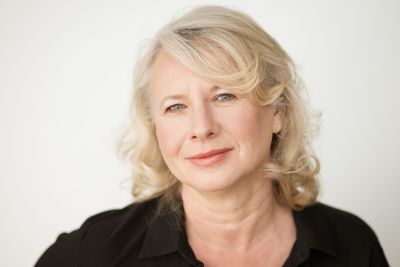
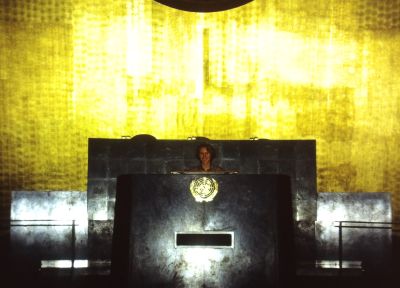
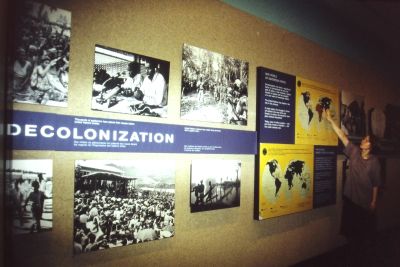
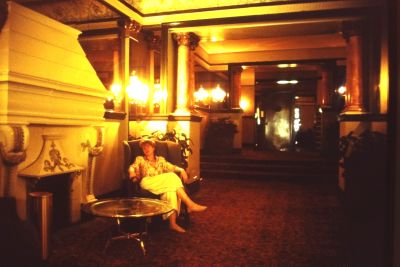
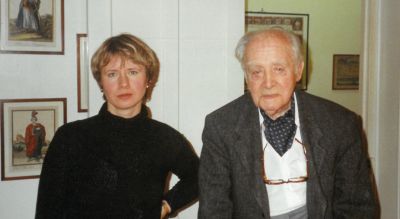
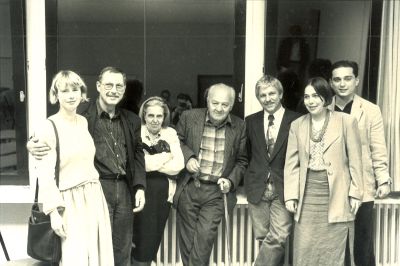

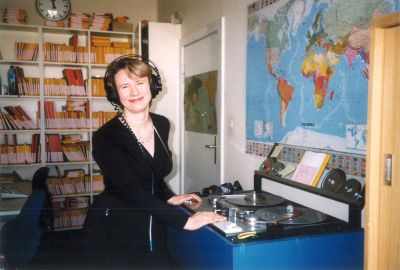
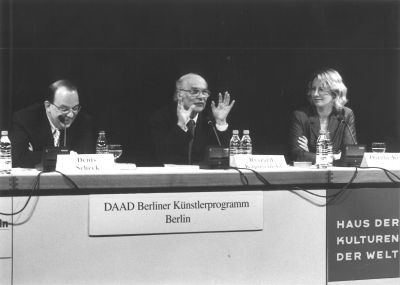
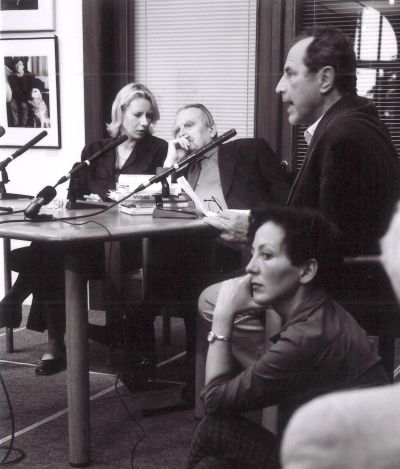
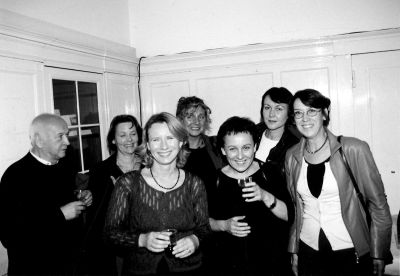
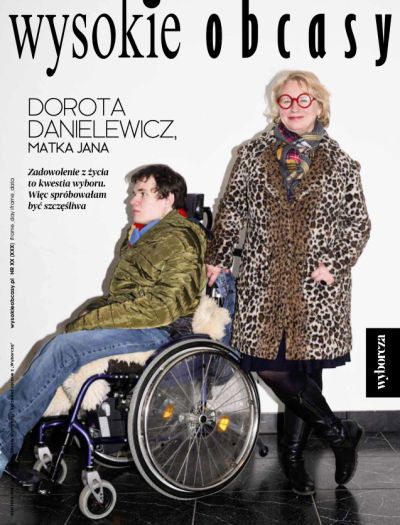
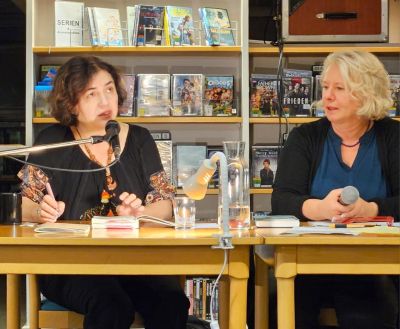

![Redakteur:innen von „COSMO [Radio] po polsku“. Von links: Tomasz Kycia, Adam Gusowski, Maciej Wiśniewski, Monika Sędzierska Redakteur:innen von „COSMO [Radio] po polsku“. Von links: Tomasz Kycia, Adam Gusowski, Maciej Wiśniewski, Monika Sędzierska](/sites/default/files/styles/width_100_tiles/public/00%20Redaktorzy%20prowadza%CC%A8cy%20audycje%20COSMO%20Radio%20po%20polsku.%20Od%20lewej%20Tomasz%20Kycia%2C%20Adam%20Gusowski%2C%20Maciej%20Wis%CC%81niewski%2C%20Monika%20Se%CC%A8dzierska.%20RBB%20Berlin%2C%202019.%20Copyright%20RBB.jpeg?itok=luTJDjgi)
